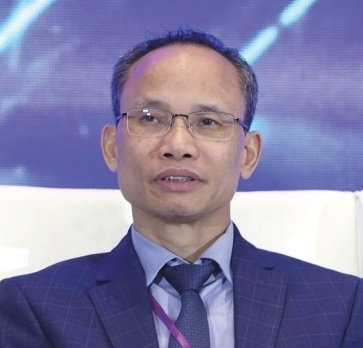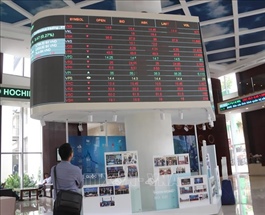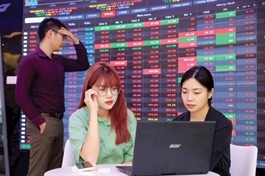Vietnamese stock market on cusp of development upgrade
Vietnamese stock market on cusp of development upgrade
A market upgrade for Vietnam is a pivotal milestone in its long journey towards building a transparent and efficient stock market, mobilising capital for the domestic economy while also enhancing its appeal to international investors.
Investors are keenly awaiting developments on October 7, when FTSE Russell will decide whether to upgrade Vietnam’s classification from frontier to secondary emerging market.
Earlier in mid-September, Minister of Finance Nguyen Van Thang, accompanied by a high-level delegation including Vu Thi Chan Phuong, chairwoman of the State Securities Commission (SSC), held working sessions at the London Stock Exchange and engaged directly with FTSE Russell on the upgrade process.
These latest developments, along with related ongoings in other sectors, were covered at last week’s Vietnam Wealth Advisory Summit in Hanoi. Speaking at the event, Bui Hoang Hai, vice chairman of the SSC, said the mission led by the Ministry of Finance (MoF) was not only aimed at promoting direct and portfolio investment inflows, but also served as a powerful opportunity to showcase Vietnam’s capital market at major financial hubs such as London and Milan.
“This can be considered a mission that exceeded all expectations, unprecedented in scale,” said Hai. “When Vietnam’s stock market is upgraded, it will not merely be a change of status, but a transformation marked by a greater supply of securities, innovative products, and stronger investor-protection mechanisms that draw in large, stable, long-term capital.”
This progress will provide a crucial foundation for the market to serve as an effective capital-raising channel for the economy while firmly elevating Vietnam’s standing on the global financial map, Hai added.

Vietnamese stock market on cusp of development upgrade, photo Duc Thanh |
Diversifying products
Hai noted that in London, nearly 200 top global asset managers representing about $16 trillion in assets attended, leading to nearly 100 bilateral meetings with Vietnamese firms and underscoring the strong global capital appetite for Vietnam’s market.
“FTSE Russell stated that no country has demonstrated such strong, direct engagement at the highest level as Vietnam,” he said. “Over the past year, all reform commitments have been delivered on time, while outstanding issues already have clear roadmaps. This has strengthened the confidence of both FTSE Russell and international investors in Vietnam’s upgrade prospects.”
On SSC’s concrete plans, Hai revealed that the MoF and SSC are working on various schemes to diversify products across equities, bonds, investment funds, and derivatives.
“In the bond market, we are revising the legal framework to soon introduce new instruments such as infrastructure bonds, public-private partnership project bonds, green bonds, and ESG-linked bonds. These will be critical tools for mobilising capital for infrastructure and sustainable development,” added Hai.
“In terms of funds, the MoF has already approved proposals for developing new fund types. Shortly, the Vietnam Stock Exchange will issue a new set of index regulations with flexible mechanisms allowing asset managers to develop customised indices. This will pave the way for new exchange-traded funds, infrastructure bond funds, and money market funds, meeting increasingly diverse investor demand,” he added.
On derivatives, Hai stressed that although this segment is crucial for the upgrade, Vietnam’s market still offers very limited products, while investor demand for hedging tools continues to rise. “SSC has identified derivatives development as a top priority in the next phase, alongside investor protection,” Hai said.
Dr. Le Duc Khanh, head of Research at VPS Securities, also noted that this year has been particularly distinctive for Vietnam’s stock market compared with previous years.
“One of the clearest indicators of the market’s strength, attractiveness, and positive momentum is liquidity. Several recent sessions on the Ho Chi Minh Stock Exchange alone have reached $2-3 billion in daily trading value. This reflects powerful inflows into the market. As a result, many stock groups, especially banks and securities firms, have broken historical price records since listing,” he said.
As for market prospects, Khanh observed that after surpassing the 2022 peak of 1,500-1,520 points, the VN-Index is now approaching a major resistance zone at around 1,800 points. “Typically, during an uptrend, the market goes through prolonged rallies lasting several months, interspersed with intermediate corrections. We have already seen four consecutive months of gains, while September served as a consolidation phase, with sideways movement and lower liquidity. Such periods often precede the start of a new upward cycle,” he said.
Khanh added that after a heavy focus on blue-chip leaders, the market is showing signs of rotation into sectors that have yet to rally significantly but remain attractive in terms of valuation. “From late September into October onwards, the story will not just be about the overall market but also about capital allocation. Sectors with low valuations and untapped upside potential will become the next focus,” he added.
Do Minh Trang, director of the Analysis Centre at ACB Securities, said the 1,700-point mark is only a median level that fits the current context, but does not fully reflect the economy’s growth trajectory or listed companies’ earnings potential.
“In fact, this is a phase of investor caution as they await key data, from Q3 GDP and macro indicators to the market-upgrade decision,” she added. “The VN-Index pausing to ‘digest’ information and consolidate its base is necessary before the next rally. In the medium term, I believe the index could head towards the 2,000-2,100 range.”
Confidence maintained
However, Trang noted that in the short term, certain risks remain, and there is a miniscule chance Vietnam is not upgraded by FTSE Russell in October. “If that happens, the risk will be more psychological than fundamental. This year, foreign investors have already recorded net outflows of around $3 billion, and for three consecutive years they have been net sellers,” she explained.
“But looking at 10-15 years of data, foreign investors have never sold more than they had previously bought. Many strategic funds that entered during the pre-initial public offering stage of major companies eventually exited after a full investment cycle. That is normal, and it opens up room for new strategic investors.”
For retail investors, Trang emphasised that the key to achieving expected returns in the current context is maintaining confidence in the long-term trend while selecting the right sectors. “Short-term risks to the stock market mainly stem from sentiment and unpredictable external shocks. However, the long-term outlook remains positive, with banking, real estate, public investment-construction materials, and retail as the four pillars likely to create strong opportunities ahead,” Trang said.
According to Dang Thanh Tung, head of Investment at Dragon Capital Vietnam, in addition to a top-down approach of analysing the overall economy and industries, a bottom-up perspective is also essential in Vietnam’s evolving business environment.
“It is important to directly assess specific companies and conglomerates that are well-positioned to benefit from key sectors which will play an increasingly important role in Vietnam’s economic development,” Tung said.
For Vietnam’s stock market, Tung stressed that after a rapid growth phase, volatility or corrections are to be expected, and such adjustments are normal for a market on the path to sustainable expansion.
“Looking to the near future, we have plenty of positive signals to support expectations of continued growth, such as Vietnam’s upgrade roadmap with FTSE Russell, the economy’s strong growth momentum, and external drivers such as a potential Fed rate cut,” he said. “In addition, a wave of high-quality, efficient enterprises preparing to list will provide further momentum.”
Taking a more cautious view, Tran Vinh Quang, CEO of Thien Viet Asset Management, noted that over the past 17 years, investing has never been easy.
“Vietnam’s stock market is still on a long-term growth trajectory. This is the most important point to state. If someone talks about exchange-rate pressure, about foreign net selling, or about concerns over not being upgraded yet, remind yourself: Vietnam’s market remains in an upward channel, and you must believe in that. Only those with conviction in the market can generate sustainable returns,” he said.
Looking ahead to the final quarter of the year, Quang agreed with Trang that banking, real estate, and retail should remain in every investor’s portfolio. “There are also emerging sectors, but in my view, they lack sufficient growth signals. For retail investors, focusing on core sectors is enough. But remember, we do not invest in a sector, we invest in specific stocks,” Quang said.
“One cannot simply generalise that banking will grow. What matters is choosing the right business model because each bank is evolving along a different path,” he noted.
|
Nguyen Thi Bich Ngoc, deputy Minister of Finance
|
The global economy continues to face difficulties, including trade tensions, geopolitical conflicts, and prolonged political instability in several countries and regions. These factors are significantly affecting economic growth prospects, inflation, and, notably, the global investment and business climate. At the same time, international financial and monetary markets are experiencing highly unpredictable fluctuations.
As Vietnam moves towards a new era, the country’s financial market is also on the cusp of significant transformation. This includes a wave of institutional breakthroughs: the stock market is nearing an upgrade to emerging market status, digital assets are beginning to be legalised, and international financial centres are being established in Vietnam.
These reforms and initiatives play a vital role in creating a new momentum for the market, unlocking more opportunities for the economy, investors, and businesses alike. In this context, where numerous variables and opportunities are intertwined, the role of professional financial advisors is more important than ever for the development of the financial sector.
There are also considerable challenges in terms of risk management and system stability. While global economic fluctuations and domestic reforms bring high profit potential, they also carry significant risks for investors. To adapt and succeed, investors need the companionship and guidance of reliable financial experts and advisors.
We believe the financial advisory community will serve as a critical bridge, helping investors identify key variables, build appropriate asset portfolios, and manage risk effectively. Timely, accurate, and effective advisory services can help turn challenges into opportunities, and transform risks into foundations for success.
Dr. Can Van Luc, member, Prime Minister’s Policy Advisory Council
|
Vietnam’s stock market in 2025 is being shaped by a combination of global headwinds and domestic momentum. Externally, the world economy is projected to grow only 2.3-2.4 per cent in 2025-2026, below the 2011–2019 average of 3 per cent.
The environment is mixed: US inflation has eased, creating room for the Federal Reserve to lower rates, while governments worldwide are directing capital towards infrastructure, the green transition, and digital technologies such as AI and semiconductors.
Yet persistent risks remain, including geopolitical instability in Ukraine and the Middle East, intensifying trade and technology disputes, high debt burdens, and sluggish recoveries in major economies. Global trade is forecast to rise just 1.8 per cent in 2025, posing clear challenges for an open economy like Vietnam, particularly if geopolitical tensions persist or global demand weakens further.
Nguyen Duc Tai, CFO, Meey Group
|
Vietnam’s real estate market continues to struggle with severe information asymmetry, which hinders transparency and investor confidence.
We are tackling this through three pillars. Meey Map digitises planning and legal data, making information accessible and reliable for users; Meey Value applies AI and big data to generate instant and objective property valuations; and Meey Network advances tokenisation to enable secure peer-to-peer transactions, contributing to safer and more transparent capital flows.
These efforts are not just product development, but the foundation of digital infrastructure the market urgently needs.
From the beginning, our orientation has been international. In July, we signed with ARC Group to guide our initial public offering process, and we are now working with Nasdaq representatives on listing requirements. At the same time, we have invested over $20 million in technology and data, collaborated with PwC for three years to gradually adopt IFRS, and aligned governance with environmental, social, and governance principles. These steps reflect the belief that global investors demand transparency, discipline, and long-term thinking.
Our journey also shows that enterprises cannot succeed internationally without regulatory support at home. Vietnam should accelerate sandbox mechanisms that allow safe but timely testing of new financial and digital models. Listing procedures and accounting frameworks must be more compatible with technology companies.
Incentives such as fast-track depreciation for research and development investments could help innovative firms scale faster. With the Digital Technology Industry Law now adopted, we are preparing to pilot tokenised property projects under Meey Network, an initiative that will only succeed if supported by a clear legal framework.
Vietnamese companies are ready to compete globally. What they need is a regulatory environment that both safeguards investors and gives space for innovation. With such a foundation, Vietnam’s digital enterprises can strengthen domestic markets while stepping onto international capital platforms.
- 22:00 29/09/2025






























